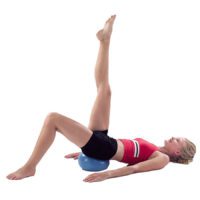What is Acupuncture?
Acupuncture, an ancient practice originating in China over 5000 years ago, is based on the belief that a balanced flow of qi, the vital life energy present in all living organisms, is crucial for maintaining good health. According to acupuncture theory, qi circulates through the body along twelve major meridian pathways connected to specific internal organs and organ systems.
During an acupuncture session, your practitioner gently inserts fine, sterile, single-use needles at specific points along the meridians. These strategic insertions aim to redirect and reposition the energy flow (qi) to alleviate tension, stress, and pain. The smooth and balanced energy flow through the meridians contributes to overall well-being. At the same time, blockages and imbalances can lead to pain and illness.
Acupuncture is commonly used in Western medicine as a pain relief treatment, often combined with other therapies such as exercise. While research evidence supporting acupuncture’s effectiveness varies, many researchers suggest further studies to understand better and help its clinical benefits (see References below for more information).
Your healthcare professional may consider acupuncture for the following conditions after a thorough assessment:
Will Acupuncture Help You?
For personalised advice regarding your pain or health condition, it’s essential to consult with your trusted healthcare practitioner. They will be able to discuss the appropriateness of acupuncture based on your clinical assessment.
As for the procedure itself, the insertion of acupuncture needles should generally be painless. You might experience a slight tingling or heaviness after the needle insertion, a typical effect your practitioner monitors during the session. At PhysioWorks, we prioritise safety and hygiene by using single-use, individually wrapped, and sterilised needles safely discarded immediately after use.
The response to acupuncture treatment varies from person to person, and your treatment schedule will depend on your specific condition. Your healthcare practitioner will discuss your personalised treatment plan based on a comprehensive clinical assessment during your consultation.
If you have private health insurance, you may be eligible for rebates on acupuncture or dry needling treatments as part of your physiotherapy consultation. It’s advisable to check with your health fund provider for more information on available coverage.
More Info:
Rochedale - Call 38410277
Book Online: RochedaleSalisbury - Call 32751044
Book Online: SalisburySandgate - Call 32691122
Book Online: SandgateAcupuncture References
Deare JC, Zheng Z, Xue CCL, Liu JP, Shang J, Scott SW, Littlejohn G. Acupuncture for treating fibromyalgia. Cochrane Database of Systematic Reviews 2013, Issue 5. Art. No.: CD007070. DOI: 10.1002/14651858.CD007070.pub2
Furlan AD, van Tulder MW, Cherkin D, Tsukayama H, Lao L, Koes BW, Berman BM. Acupuncture and dry-needling for low back pain. Cochrane Database of Systematic Reviews 2005, Issue 1. Art. No.: CD001351. DOI: 10.1002/14651858.CD001351.pub2
Green S, Buchbinder R, Barnsley L, Hall S, White M, Smidt N, Assendelft WJJ. Acupuncture for lateral elbow pain. Cochrane Database of Systematic Reviews 2002, Issue 1. Art. No.: CD003527. DOI: 10.1002/14651858.CD003527
Green S, Buchbinder R, Hetrick SE. Acupuncture for shoulder pain. Cochrane Database of Systematic Reviews 2005, Issue 2. Art. No.: CD005319. DOI: 10.1002/14651858.CD005319
Linde K, Allais G, Brinkhaus B, Fei Y, Mehring M, Shin B, Vickers A, White AR. Acupuncture for the prevention of tension-type headache. Cochrane Database of Systematic Reviews 2016, Issue 4. Art. No.: CD007587. DOI: 10.1002/14651858.CD007587.pub2
Manheimer E, Cheng K, Linde K, Lao L, Yoo J, Wieland S, van der Windt DAWM, Berman BM, Bouter LM. Acupuncture for peripheral joint osteoarthritis. Cochrane Database of Systematic Reviews2010, Issue 1. Art. No.: CD001977. DOI: 10.1002/14651858.CD001977.pub2.
Ning, Z. and Lao, L. (2015). Acupuncture for Pain Management in Evidence-based Medicine. Journal of Acupuncture and Meridian Studies, 8(5), pp.270-273.
Villarreal Santiago, M., Tumilty, S., Mącznik, A. and Mani, R. (2016). Does Acupuncture Alter Pain-related Functional Connectivity of the Central Nervous System? A Systematic Review. Journal of Acupuncture and Meridian Studies, 9(4), pp.167-177.









































